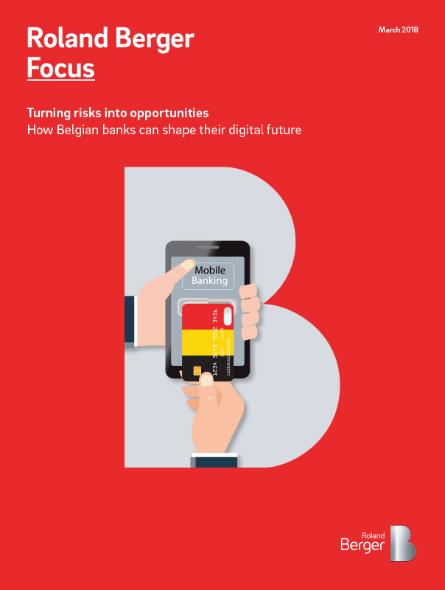How Belgian banks can shape their digital future
![{[downloads[language].preview]}](https://www.rolandberger.com/publications/publication_image/388_cover_roland_berger_beligan_banks_download_preview.jpg)
Belgian banks should now develop strategies to integrate digital banking, artificial intelligence, blockchain and big data into their business-models.


Currently Belgian banks operate on the profitability level before the crisis of 2008-09. Yet many officials are concerned about the impact of disruptive technologies on their business-models.
The seven most important areas of innovations cover digital banking, big data, robot process automation, artificial intelligence, peer-to-peer networks, blockchain and open banking. The Roland Berger study "Belgian Banks" analyses each of them including examples of upcoming FinTechs in Belgium and international banks with relevant expertise.
If one takes a closer look on the potentials and dangers of upcoming banking technologies, generally the opportunities seem much stronger. This Roland Berger study shows that effective change management can lead to significant business improvement generating short term and long term profits whereby the focus should be on the main four aspects of digital banking, artificial intelligence, blockchain and big data. Calculations lead to the result that in this way an estimated 1.9 ppt. increase in ROE during the next three to five years and 5 ppt. within the next ten years could be generated. An additional recommendation would be to engage in the management of open banking in order to increase profitability.
"Open banking will facilitate the entry of new and non-traditional players into the financial services market."
An example of an innovation driver in the field of open banking is Ibanity. The company was established in 2016 in Brussels and one year later was purchased by the Isabel Group. The company offers API and SDK solutions, which support FinTechs and other banking service providers to access the data from banks with the aim to develop new apps and increase the benefits for end-clients. Ibanity does not only act as an intermediary, but also ensures compliance with the PSD2 EU directives and a decrease of IT expenditures for banks.
Along with the digitization process also the competition between the banks on an international level and to BigTechs increases. In order not to be left behind, it is crucial for Belgian banks to define a profound strategy, how to integrate the new technologies into their existing business-models and their corporate culture. The study provides a roadmap to higher profits – starting from assessing the respective ecosystem, choosing the innovations-approach according the DNA of the bank and selecting suitable technologies and partners

![{[downloads[language].preview]}](https://www.rolandberger.com/publications/publication_image/388_cover_roland_berger_beligan_banks_download_preview.jpg)
Belgian banks should now develop strategies to integrate digital banking, artificial intelligence, blockchain and big data into their business-models.
